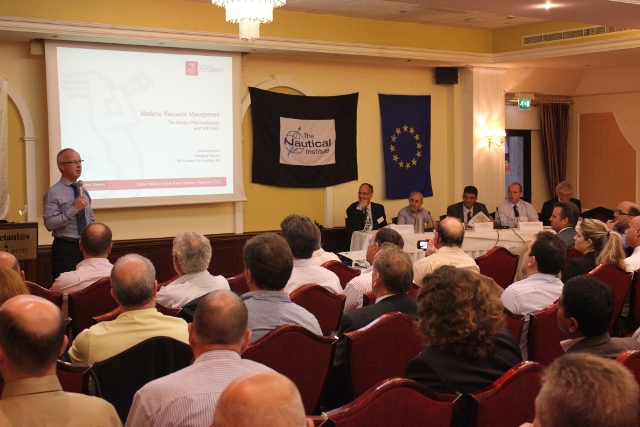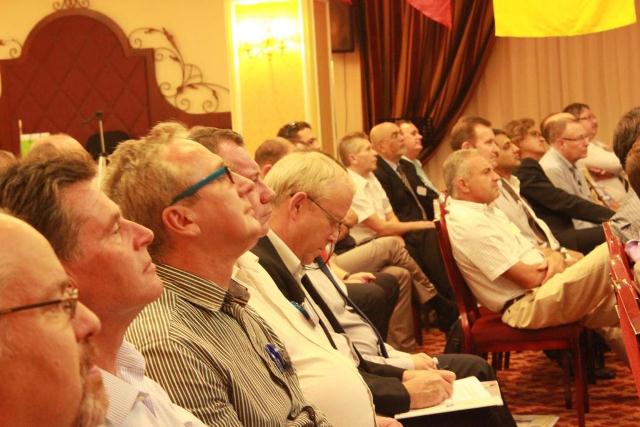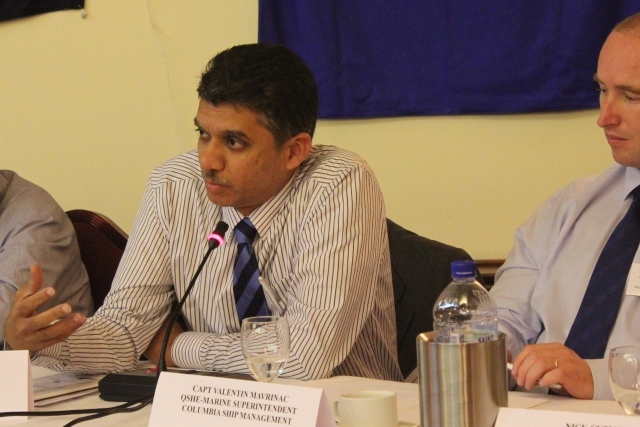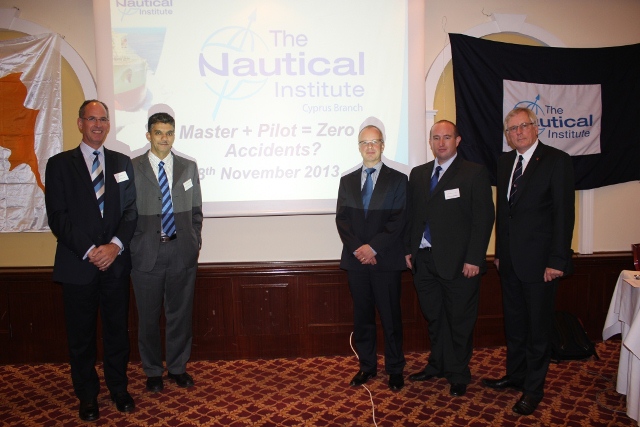
Martin Hernqvist of ALL Academy talking about “The Master/Pilot relationship and soft skills”.

Nautical Institute’s seminar on the Master/Pilot relationship attracted a large number of people and discussions were lively.

Captain Sivaraman Krishnamurthi, President of the Nautical Institute, responding to questions from the audience.

The speakers at the seminar, from left to right: Graham Cowling, Operations Manager at Marlow Navigation, Sivaraman Krishnamurthi, President of the Nautical Institute, Martin Hernqvist, Managing Director of ALL Academy and The Swedish Club Academy, Valentin Mavrinac, Marine Superintendent with Columbia Shipmanagement and Nick Cutmore, Secretary General of International Maritime Pilots’ Association (IMPA).
BRANCH CHAIRMAN’S WELCOME ADDRESS
The Master-Pilot relationship is a complex one. This ‘specialist’ navigator must be quickly integrated into the Bridge team as soon as he arrives onboard and needs its full support. On the other hand, ‘To Master’s orders and Pilot’s advice’ still holds good and the consequences of any navigational mishap always stay with the ship. So how do we make sure the Pilot is fit for the task, gets the full support he needs and brings the ship in and out of port with ‘zero accidents’? This seminar will focus on the main issues from the Pilot and Master’s points of view and then provide some answers.
When our Branch Committee first met earlier this year to discuss the topic for a half-day seminar, we wanted to raise an important topic for our 20th year anniversary. By some estimates, the shipping industry is paying US$ 50 million a year on navigational accidents in pilotage waters. Pilots are expected to take care of the interests of the local port, waterway and infrastructure as well as report on navigational deficiencies noted on board so the traditional role as ‘advisor to the Master’ is becoming increasingly unclear. For example, a ship may manoeuvre into a new port every day but the tug masters may not speak English and traffic flow in the port is in the hands of the Vessel Traffic Service (VTS) – how much control on their port manoeuvres do the Bridge Team really have?
Pilots are an invaluable addition to the Bridge for their local knowledge and for their coordination with tugs / linesmen etc. The accidents during harbour manoeuvring may not necessarily be due to faults in the Master-Pilot relationship itself (which is but one component of the Pilotage operation). There are other factors to consider, such as inadequate planning, poor attitude, multi-tasking / multiple demands on the individuals, inadequate infrastructure / planning in ports, actual or imagined time constraints, role of the VTS, technical-failure and lack of contingency plans.
The topic has been the subject of several articles but has yet to be extensively debated in the Nautical Institute forums. Is radical reorganization of Master-Pilot responsibilities possible? While the competency standards of Masters are regulated by IMO STCW, Pilots and Tugs usually operate under national competency requirements and perhaps international ‘recommendations’, which might not be binding. In some countries, the Pilot is obligated to remove himself from the Bridge after an incident in order not to prejudice possible liability. These are issues requiring careful consideration.
It is noteworthy that there are several ports of the world where fewer accidents occur than in other places. There are obviously best-practices to be shared. There is enormous potential for ship-shore interchange of passage planning in ports. Two very experienced navigators – the Master and the Pilot on the Bridge should ideally result in ‘Zero Accidents’ – but we are all painfully aware that this is currently not the case.
Does the industry require a quantum leap in managing navigation with the Pilot onboard?
Graham Cowling, FNI, Chairman, Nautical Institute, Cyprus Branch

This subject is bang on target! International legislation should also govern Duties and responsibilities of Pilot, who is critical to safe passage from pilot stn to berth. “Master’s Orders n Pilots advise” is more a legal thing to pin all responsibility on Master! Master is seriously handicapped when language issues come up in interactions of Pilot with Tugs / Port / VTS. And local area / depths (recently dredged, etc) knowledge. English should be imposed on ALL Pilot activities, just as Chinese crew also need to establish English as their language for external communications. It’s about time we FOCUS on this important “gap”!
I think we need to be clear here that English is already the language required of Pilots, per IMO Resolution A960 Annex II, Para 6. The absence of English Language skills from tugs, line-handlers, lock-keepers, VTS operators and local Non-SOLAS traffic is not an easily addressed subject. The previous comment needs to be re-phrased about imposing English on ALL persons operating in and around pilotage waters, and avoid the inference that the Pilot is part of the problem.
I have attended MRM course recently, as my feeling, it’s very helpful for me to deal with relationship with others inculding pilot. So I suggest all pilots also attend MRM course since lots of pilots are lack of skills of how to co-operate with ship’s master, especilly some middle east pilot.(They act as both pilot and also port authorities).